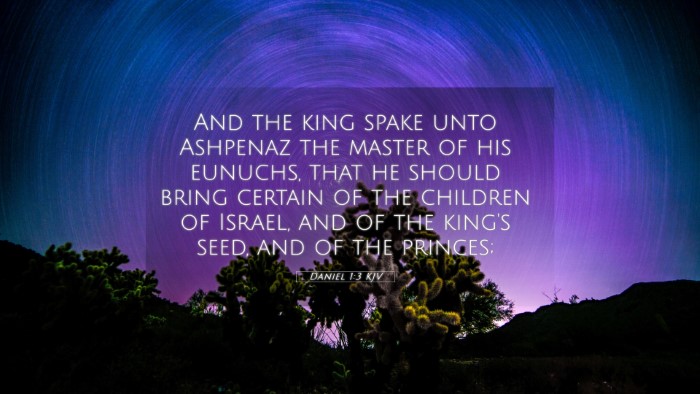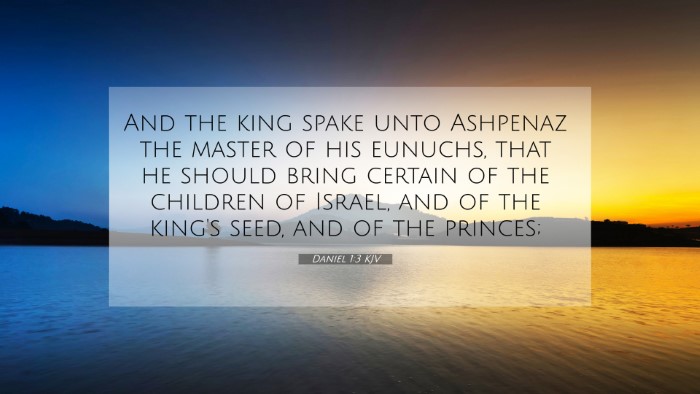Old Testament
Genesis Exodus Leviticus Numbers Deuteronomy Joshua Judges Ruth 1 Samuel 2 Samuel 1 Kings 2 Kings 1 Chronicles 2 Chronicles Ezra Nehemiah Esther Job Psalms Proverbs Ecclesiastes Song of Solomon Isaiah Jeremiah Lamentations Ezekiel Daniel Hosea Joel Amos Obadiah Jonah Micah Nahum Habakkuk Zephaniah Haggai Zechariah MalachiDaniel 1:3 Similar Verses
Daniel 1:3 Cross References
And the king spake unto Ashpenaz the master of his eunuchs, that he should bring certain of the children of Israel, and of the king's seed, and of the princes;
Uncover the Rich Themes and Topics of This Bible Verse
Listed below are the Bible themes associated with Daniel 1:3. We invite you to explore each theme to gain deeper insights into the Scriptures.
Daniel 1:3 Cross Reference Verses
This section features a detailed cross-reference designed to enrich your understanding of the Scriptures. Below, you will find carefully selected verses that echo the themes and teachings related to Daniel 1:3 KJV. Click on any image to explore detailed analyses of related Bible verses and uncover deeper theological insights.
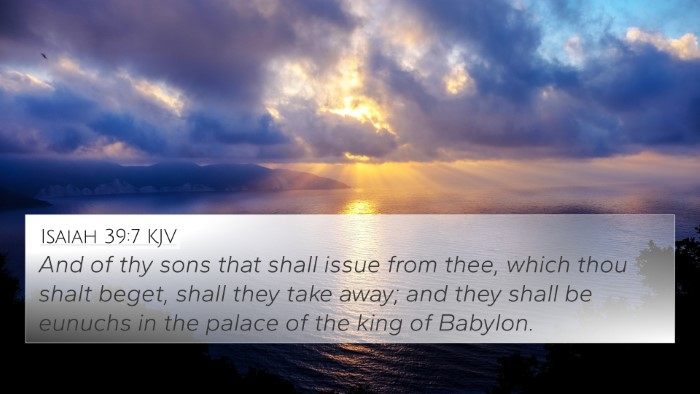
Isaiah 39:7 (KJV) »
And of thy sons that shall issue from thee, which thou shalt beget, shall they take away; and they shall be eunuchs in the palace of the king of Babylon.
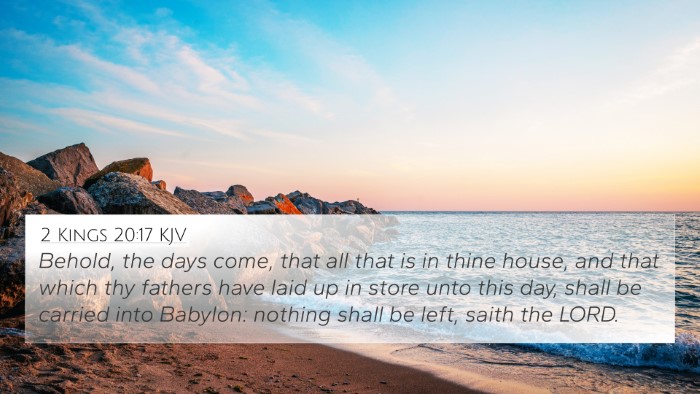
2 Kings 20:17 (KJV) »
Behold, the days come, that all that is in thine house, and that which thy fathers have laid up in store unto this day, shall be carried into Babylon: nothing shall be left, saith the LORD.
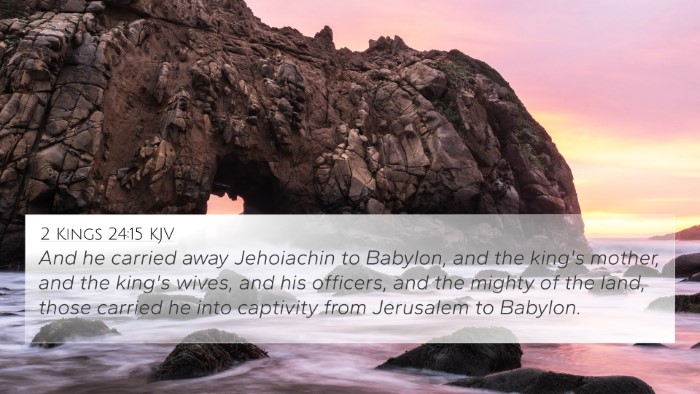
2 Kings 24:15 (KJV) »
And he carried away Jehoiachin to Babylon, and the king's mother, and the king's wives, and his officers, and the mighty of the land, those carried he into captivity from Jerusalem to Babylon.
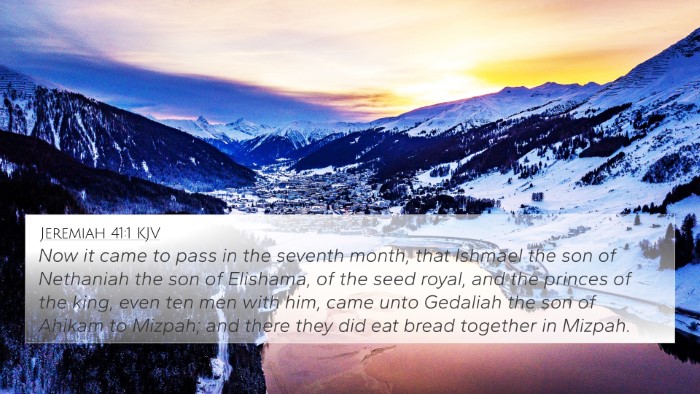
Jeremiah 41:1 (KJV) »
Now it came to pass in the seventh month, that Ishmael the son of Nethaniah the son of Elishama, of the seed royal, and the princes of the king, even ten men with him, came unto Gedaliah the son of Ahikam to Mizpah; and there they did eat bread together in Mizpah.
Daniel 1:3 Verse Analysis and Similar Verses
Bible Verse: Daniel 1:3 - "Then the king instructed Ashpenaz, the master of his eunuchs, to bring some of the children of Israel and some of the king’s descendants and some of the nobles."
The verse encapsulates a significant moment in the narrative of captivity experienced by the Israelites. Here we see King Nebuchadnezzar of Babylon taking specific actions to assert control and influence over the Jewish population, represented particularly by the youth of noble lineage.
Meaning and Insights from Commentaries
-
Matthew Henry Commentary: Henry notes that this action by Nebuchadnezzar demonstrates a deliberate strategy to assimilate conquered peoples by cultivating strong connections with their young leaders. He emphasizes that the choice of young, noble individuals reflects an aim to reshape the identity of the Israelites through education and exposure to Babylonian culture.
-
Albert Barnes Commentary: Barnes elaborates that the king sought not just any captives but those who had potential for exceptional abilities. He argues that by choosing children from noble families, Nebuchadnezzar intended to secure loyalty through indoctrination, thus embedding Babylonian influence within the ruling class of Israel.
-
Adam Clarke Commentary: Clarke highlights the significance of the "children" mentioned in this verse, noting that the term reflects youth but also implies a sense of vulnerability. He discusses the spiritual implications of this event, suggesting that it serves as a broader commentary on the dangers of cultural assimilation and the importance of maintaining one’s identity in a foreign land.
Cross-References to Consider
- Jeremiah 29:4-7: God's instruction to the exiles in Babylon to seek the peace of the city symbolizes the call for wisdom in captivity.
- 2 Kings 20:17-18: Here we see the prophecy regarding the Babylonian captivity, emphasizing the loss of the Hebrew nobility's influence.
- Isaiah 39:7: A prophecy of exile that alludes to the fate of Hebrew children, linking them to future Babylonian influence.
- Daniel 1:6-7: This follows with the detailed account of the chosen youths, revealing their names and the transformative education they received.
- Proverbs 22:6: The importance of training a child in the way they should go relates to the influence of their early experiences.
- Philippians 3:20: A reflection on identity, as believers are reminded that their citizenship is in heaven, contrasting with the identity shifts in Babylon.
- Romans 12:2: Encouragement against conforming to the world, mirroring the struggles faced by those in the Babylonian court.
- 1 Peter 2:11-12: A reminder that believers are sojourners and strangers, akin to the exiled Israelites contending for their identity.
- Matthew 28:19-20: The Great Commission reflects how the new believers are to go into the world, similar to how these youths were positioned within a foreign culture.
- Exodus 34:12: A reminder of the importance of keeping one's distinctiveness in a foreign land, paralleling the plight of Daniel and his friends.
Thematic Bible Verse Connections
This verse not only highlights the historical context but also opens avenues for thematic connections throughout the Bible, especially regarding:
- The Nature of Exile: How God’s people respond and adapt in foreign lands (Jeremiah 29).
- Cultural Assimilation vs. Identity: The constant struggle to uphold one’s beliefs while participating in a different culture (Romans 12:2).
- Divine Purpose in Trials: Recognizing that even in captivity, God’s hand is at work for good (Jeremiah 29:11).
- Leadership and Influence: The responsibility of believers to shine as lights in a dark world (Matthew 5:14-16).
Bible Study Tools and Resources
For those delving deeper into the connections and cross-referencing of biblical texts, consider the following tools:
- Bible concordance
- Bible cross-reference guide
- Cross-reference Bible study strategies
- Bible reference resources for advanced studies
- Comprehensive Bible cross-reference materials for thorough thematic studies
Practical Applications and Reflections
This verse and its compelling insights can guide contemporary believers in understanding the importance of:
- Maintaining faith and integrity in challenging environments.
- Understanding the strategic use of youth and education in shaping future leaders.
- Recognizing the broader implications of cultural influence on personal and communal identity.
- Reflecting on the importance of cross-referencing biblical truths to enhance understanding and resolve conflicts in faith.
Conclusion
In summary, Daniel 1:3 sets the stage for an exploration of the themes of exile, identity, and cultural influence. When cross-referenced with other pertinent scriptures, it deepens our understanding of the trials faced by God’s people throughout history. By learning how to effectively engage with these connections through dedicated study, believers can better navigate their own journeys of faith.

